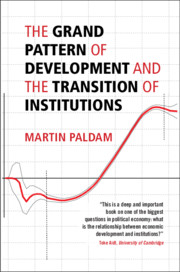Book contents
- The Grand Pattern of Development and the Transition of Institutions
- The Grand Pattern of Development and the Transition of Institutions
- Copyright page
- Contents
- Figures
- Tables
- Preface
- Part I Main Ideas
- Part II The Transitions of Institutions
- Contents
- Part IIA The Democratic Transition
- Part IIB The Transition of the Economic System
- Part IIC The Transitions in Traditions and Beliefs
- Contents
- 10 The Transition of Corruption
- 11 The Religious Transition
- Part III The Grand Transition
- References
- Index
11 - The Religious Transition
from Part IIC - The Transitions in Traditions and Beliefs
Published online by Cambridge University Press: 07 August 2021
- The Grand Pattern of Development and the Transition of Institutions
- The Grand Pattern of Development and the Transition of Institutions
- Copyright page
- Contents
- Figures
- Tables
- Preface
- Part I Main Ideas
- Part II The Transitions of Institutions
- Contents
- Part IIA The Democratic Transition
- Part IIB The Transition of the Economic System
- Part IIC The Transitions in Traditions and Beliefs
- Contents
- 10 The Transition of Corruption
- 11 The Religious Transition
- Part III The Grand Transition
- References
- Index
Summary
The chapter disregards peoples’ religion, but analyzes their religiosity, which is defined as the importance of religion in all aspects of life. The role of religiosity in the theory of growth is outlined. Religion enters as a stable part of the otherwise strongly increasing knowledge. A factor analysis of 14 items from the World Values Survey shows that the first factor – defined as the R-index – is strong and robust, while other minor factors lack robustness. All 14 items, and hence the R-index, are negatively correlated to income, giving a strong but fuzzy relation, which is a clear and robust transition curve that is nearly linear. It is unfortunate that the United States and China are the main outliers. The main causal direction is from income to religiosity, though there is some simultaneity. The per capita density of churches is used as a proxy for long-run religiosity. A series since year 1300 is compiled, but for Denmark only. It shows an even stronger transition than the wide cross-country data. Thus, equivalence is confirmed to the extent that it is possible to do so.
Keywords
- Type
- Chapter
- Information
- Publisher: Cambridge University PressPrint publication year: 2021



